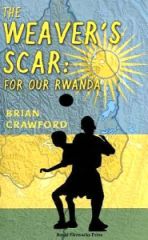The Weaver’s Scar for our Rwanda
 The Weaver's Scar for our Rwanda
The Weaver's Scar for our Rwanda
Fiction / Middle / YA
Royal Fireworks Press
2014
169 pp.
ISBN 978-0-89824-477-9

In his engaging novel, The Weaver’s Scar, Brian Crawford introduces young readers to the 1994 Rwandan genocide through the eyes of a young boy called Faustin. Faustin leads a normal life in the village of Inkovu where he lives with his father, mother, and older brother. He loves to run and enjoys playing soccer with his friends. However, his life is overshadowed by dark family secrets that he does not understand – secrets that seem to be at the core of his father’s unreasonable rules in imposing who Faustin’s friends should be and the fun activities in which he should engage.
Faustin begins to understand his father when divisions between Hutus and Tutsis are emphasized at school by his teachers and when he starts to face hostility from his former friends on the soccer field. As the genocide events unfold, Faustin discovers what caused his father’s disability, experiences the cruelty of his teachers, and witnesses the unbelievable horror as neighbors turn against each other. As a wave of killings ensues Faustin’s own life depends on the unlikely devotion of a family enemy, someone he cannot fully trust.
Though a fictional story, Crawford strikes a great balance in the telling of the hostilities between Tutsis and Hutus during the genocide, a balance that is not usually captivated in mainstream literature. Above the backdrop of this subject, his story brings out a boy’s strained relationship with his father, the power of friendship and the redemptive hope of achieving one’s dreams – story lines that young readers can relate to.
The downside of this book is that it contains horrific scenes that younger and more sensitive readers may find disturbing. Additionally, the concept of “tribes” is currently shunned in the Rwandan community in an effort to cement relationships and prevent hostilities arising from “tribalism,” this point is missing in the book and may be crucial for foreign readers as they try to grasp the context – past and present, of the Rwandan genocide. Moreover, for those who understand Kinyarwanda, the language is sometimes too formal for a conversation between two young boys, conveying a certain degree of respect that is usually reserved for instances when someone is speaking to an older person.
I recommend this book for brave young readers who are ready to explore a complex issue from the view point of a peer.
Reviewed by Alida Uwera
Published in Africa Access Review (May 30, 2014)
Copyright 2014 Africa Access
